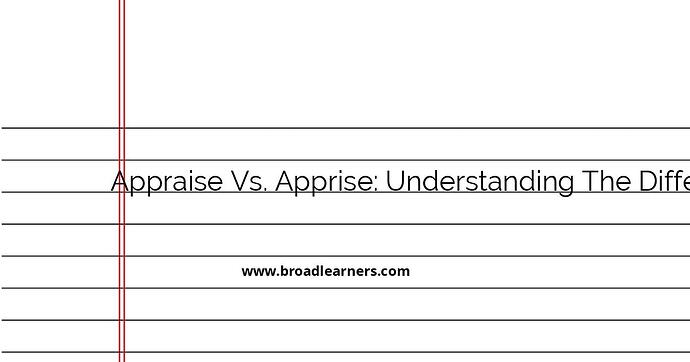The words 'appraise' and 'apprise' often cause confusion due to their similar spellings and pronunciations. However, they have distinct meanings and uses in the English language. This article will help you understand the fundamental differences between 'appraise' and 'apprise,' so you can use them correctly in your writing and conversations.
Understanding 'Appraise'
The verb 'appraise' means to evaluate, estimate, or assess the value or quality of something. It is commonly used in contexts involving financial or property assessments but can also pertain to assessing other kinds of value or worth.
Examples of 'Appraise':
- Example 1:
Before purchasing the property, the buyer had an expert appraise the house to determine its market value.
In this example, 'appraise' is used to describe the act of evaluating the monetary value of a house.
- Example 2:
During the performance review, the manager took time to appraise the employee's year's work.
Here, 'appraise' refers to assessing the quality of the employee's performance.
Understanding 'Apprise'
The verb 'apprise' means to inform or notify someone about something. It typically involves keeping someone updated or making them aware of particular facts or developments.
Examples of 'Apprise':
- Example 1:
The project manager will apprise the team of any changes in the schedule.
In this context, 'apprise' is used to convey the act of notifying the team about schedule changes.
- Example 2:
Please apprise me of any updates regarding the client's feedback.
Here, 'apprise' means to inform someone about new information or developments concerning client feedback.
Key Differences Summarized
- Appraise is primarily used for assessing, evaluating, or estimating value or quality.
- Apprise is primarily used for informing or notifying people about information or updates.
Understanding the differences between 'appraise' and 'apprise' will enhance your communication skills by ensuring you use these terms accurately. By remembering that 'appraise' relates to evaluating value and 'apprise' concerns informing, you will avoid common errors associated with these similar-sounding words.
Did I miss anything? Respond below
